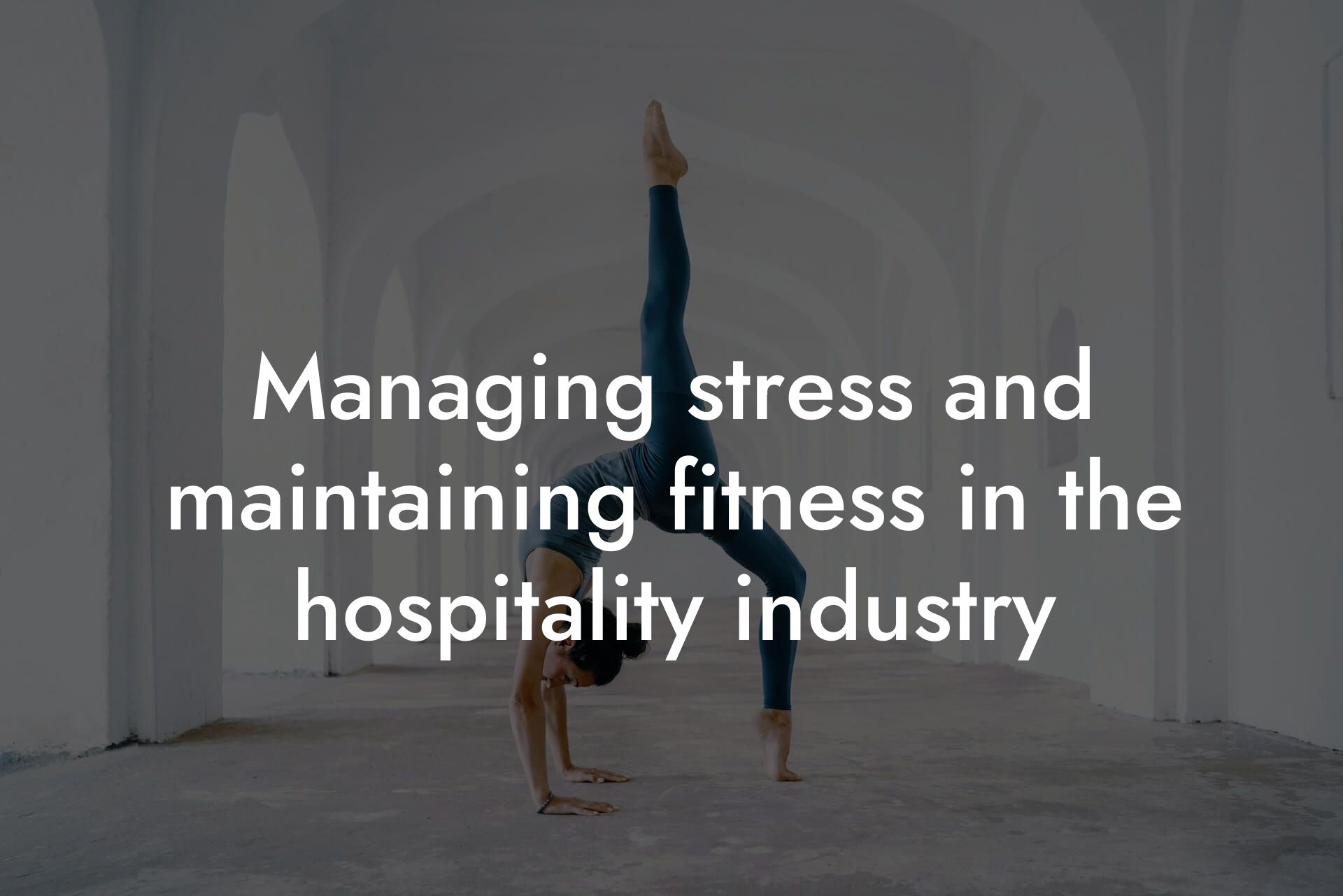As a chef, maintaining fitness can be a daunting task, especially when working long hours in the kitchen. The demands of the job can leave you feeling exhausted, both physically and mentally. However, it's essential to prioritize your health and fitness to perform at your best and avoid burnout. At Tano Performance Group, we understand the challenges that high-earning professionals face in maintaining their physical appearance, body fat, physique, and bone density. In this article, we'll provide you with practical tips and strategies to help you maintain fitness despite the long hours in the kitchen.
Table of Contents
The Challenges of Being a Chef
Being a chef is a physically demanding job that requires long hours of standing, lifting, and moving around the kitchen. The fast-paced environment can be stressful, leading to fatigue, muscle strain, and injuries. Additionally, the temptation to taste and sample dishes can lead to unhealthy eating habits, making it challenging to maintain a healthy weight and body composition. Furthermore, the irregular schedules and late nights can disrupt your sleep patterns, making it difficult to establish a consistent exercise routine.
Creating a Fitness Plan
To maintain fitness as a chef, it's essential to create a workout plan that suits your schedule and lifestyle. Start by identifying your fitness goals, whether it's to improve cardiovascular health, increase strength, or reduce body fat. Then, schedule your workouts around your kitchen shifts, aiming for at least 30 minutes of moderate-intensity exercise per session, three to four times a week. Consider high-intensity interval training (HIIT) or strength training exercises that can be done in a short amount of time.
Incorporating Kitchen-Friendly Exercises
You don't need to leave the kitchen to get a workout. There are several exercises you can do during downtime or breaks to keep your blood flowing and muscles engaged. Try doing squats while waiting for sauces to simmer, or do a few sets of push-ups during prep work. You can also use kitchen utensils as makeshift dumbbells or resistance bands to work on your strength and flexibility.
Healthy Eating Habits
As a chef, you have access to a wide variety of ingredients and dishes, but it's essential to make healthy choices to support your fitness goals. Focus on whole, unprocessed foods like fruits, vegetables, lean proteins, and whole grains. Avoid sugary drinks and snacks, and limit your intake of saturated fats and refined carbohydrates. Consider meal prepping or cooking healthy meals in bulk to save time and energy.
Staying Hydrated
Staying hydrated is crucial, especially in a hot and humid kitchen environment. Aim to drink at least eight glasses of water per day, and avoid sugary drinks that can dehydrate you further. Consider keeping a refillable water bottle in the kitchen to remind you to drink regularly throughout your shift.
Managing Stress and Sleep
Stress and lack of sleep can have a significant impact on your fitness and overall health. Practice stress-reducing techniques like meditation, deep breathing, or yoga to help manage kitchen stress. Prioritize sleep by establishing a consistent sleep schedule, creating a relaxing bedtime routine, and avoiding caffeine and electronics before bedtime.
Using Technology to Your Advantage
There are several apps and tools available that can help you track your fitness progress, monitor your nutrition, and stay motivated. Consider using a fitness tracker or smartwatch to track your daily activity levels, or download an app that provides healthy recipes and meal planning tools. At Tano Performance Group, we use DEXA machines to provide professionals with a complete body assessment, helping them understand their body composition, bone density, and other health metrics.
Maintaining fitness as a chef requires creativity, discipline, and dedication. By creating a fitness plan, incorporating kitchen-friendly exercises, eating healthy, staying hydrated, managing stress and sleep, and using technology to your advantage, you can overcome the challenges of the job and achieve your fitness goals. Remember, taking care of your physical health is essential to performing at your best in the kitchen and achieving long-term success in your career. At Tano Performance Group, we're committed to helping high-earning professionals like you achieve their fitness goals and take their business to the next level.
Frequently Asked Questions
How can chefs maintain their fitness despite long hours in the kitchen?
As a chef, it can be challenging to prioritize fitness when you're spending long hours on your feet, but it's not impossible. By incorporating small changes into your daily routine, such as taking short breaks to stretch, eating nutritious meals, and scheduling exercise sessions, you can maintain your physical fitness despite the demands of your job.
What are some common health risks associated with being a chef?
Chefs are at risk for a range of health problems, including obesity, musculoskeletal disorders, and cardiovascular disease. This is due to the physical demands of the job, combined with the often-unhealthy food options and sedentary nature of kitchen work.
How can I prioritize self-care as a chef?
Prioritizing self-care as a chef is essential for maintaining your physical and mental health. This can include activities such as meditation, yoga, and spending time with loved ones. It's also important to schedule time for yourself, whether that's a relaxing bath or a solo walk outside.
What are some healthy snack options for chefs?
As a chef, it can be tempting to reach for unhealthy snacks, but there are plenty of healthy options available. Consider keeping nuts, seeds, and dried fruits on hand, as well as energy-boosting snacks like hummus and veggies or protein-rich hard-boiled eggs.
How can I stay hydrated in the kitchen?
Staying hydrated is crucial for chefs, who often work in hot and humid environments. Make sure to drink plenty of water throughout the day, and consider keeping a refillable water bottle nearby. You can also infuse your water with fruits or herbs for added flavor.
What are some exercises I can do in the kitchen to stay active?
There are plenty of exercises you can do in the kitchen to stay active, even on the busiest of days. Try doing squats while you're waiting for a dish to cook, or do some arm circles while you're chopping vegetables. You can also do some quick stretches to loosen up your muscles.
How can I manage stress in the kitchen?
Managing stress in the kitchen is essential for maintaining your physical and mental health. Try taking deep breaths, practicing mindfulness, or listening to calming music to help reduce stress. You can also prioritize tasks, delegate responsibilities, and take regular breaks to help manage your workload.
What are some healthy meal prep options for chefs?
As a chef, it can be challenging to prioritize meal prep, but it's essential for maintaining your physical health. Consider prepping healthy meals like salads, soups, or stir-fries, and keep them in the fridge or freezer for quick reheating. You can also prep healthy snacks like energy balls or trail mix.
How can I get enough sleep as a chef?
Getting enough sleep is crucial for chefs, who often work late nights and early mornings. Try establishing a consistent sleep schedule, creating a relaxing bedtime routine, and avoiding screens before bed. You can also prioritize napping during the day to help recharge.
What are some ways to stay motivated to exercise as a chef?
Staying motivated to exercise as a chef can be challenging, but there are plenty of ways to do so. Try finding a workout buddy, setting achievable fitness goals, and rewarding yourself for reaching milestones. You can also mix up your workout routine to avoid boredom and keep things interesting.
How can I prioritize my mental health as a chef?
Prioritizing your mental health as a chef is essential for maintaining your overall well-being. This can include activities such as meditation, yoga, and talking to a therapist. It's also important to prioritize self-care, set boundaries, and take time off when needed.
What are some healthy alternatives to chef's uniforms?
Traditional chef's uniforms can be hot, heavy, and uncomfortable, which can negatively impact your physical health. Consider switching to breathable, moisture-wicking fabrics, or looking into alternative uniform options like aprons or chef's coats with built-in cooling technology.
How can I stay active during my days off?
Staying active on your days off is essential for maintaining your physical fitness as a chef. Try incorporating activities like hiking, biking, or swimming into your routine, or schedule workout sessions with a personal trainer. You can also prioritize household chores, like gardening or cleaning, to keep yourself active.
What are some healthy breakfast options for chefs?
As a chef, it can be challenging to prioritize breakfast, but it's essential for maintaining your energy levels throughout the day. Consider healthy options like oatmeal with fruit, scrambled eggs with veggies, or Greek yogurt with nuts and seeds.
How can I maintain my bone density as a chef?
Maintaining your bone density as a chef is essential for reducing the risk of osteoporosis and fractures. This can include activities such as weight-bearing exercises, like running or jumping, as well as incorporating calcium-rich foods into your diet.
What are some ways to reduce body fat as a chef?
Reducing body fat as a chef can be challenging, but there are plenty of ways to do so. Try incorporating healthy fats into your diet, like avocado and nuts, and prioritize lean protein sources like chicken and fish. You can also increase your physical activity levels and reduce your overall caloric intake.
How can I improve my physique as a chef?
Improving your physique as a chef requires a combination of healthy eating and regular exercise. Try incorporating strength-training exercises into your routine, like weightlifting or bodyweight exercises, and prioritize cardio activities like running or cycling. You can also focus on flexibility exercises, like yoga or Pilates, to improve your overall range of motion.
What are some healthy lunch options for chefs?
As a chef, it can be challenging to prioritize lunch, but it's essential for maintaining your energy levels throughout the day. Consider healthy options like salads, soups, or whole grain sandwiches, and prioritize lean protein sources like chicken or turkey.
How can I stay energized throughout my shift?
Staying energized throughout your shift as a chef is essential for maintaining your physical and mental health. Try incorporating energy-boosting snacks into your routine, like nuts or dried fruits, and prioritize staying hydrated by drinking plenty of water.
What are some ways to reduce inflammation as a chef?
Reducing inflammation as a chef is essential for maintaining your overall health. Try incorporating anti-inflammatory foods into your diet, like turmeric or ginger, and prioritize omega-3 rich foods like salmon or walnuts. You can also reduce inflammation through regular exercise and stress management techniques.
How can I prioritize my overall health and wellness as a chef?
Prioritizing your overall health and wellness as a chef requires a holistic approach. Try incorporating healthy habits into your daily routine, like regular exercise, healthy eating, and stress management techniques. You can also prioritize self-care, set boundaries, and take time off when needed to recharge.
What are some healthy snack options for chefs on-the-go?
As a chef, it can be challenging to prioritize healthy snacks when you're on-the-go. Consider keeping healthy options like energy bars, nuts, or dried fruits in your bag, or prep healthy snacks like energy balls or trail mix in advance.
How can I stay motivated to prioritize my health and wellness as a chef?
Staying motivated to prioritize your health and wellness as a chef requires a combination of goal-setting, accountability, and self-care. Try setting achievable health goals, finding a workout buddy or accountability partner, and prioritizing self-care activities like meditation or yoga. You can also reward yourself for reaching milestones to stay motivated.
Here are some related articles you might love...
- The impact of physical health on creativity in culinary arts
- Managing stress and maintaining fitness in the hospitality industry
- Quick workouts for chefs and hospitality staff
- The connection between physical fitness and guest satisfaction
- Balancing food tasting with personal fitness goals
- The importance of DEXA scans for culinary and hospitality professionals
- Nutrition tips for maintaining energy during long service hours
- How hospitality professionals can stay active during busy shifts
- The role of physical fitness in preventing kitchen-related injuries
Zak Faulkner
Zak Faulkner is a leading authority in the realm of physical health and body composition analysis, with over 15 years of experience helping professionals optimise their fitness and well-being. As one the experts behind Tano Performance Group, Zak has dedicated his career to providing in-depth, science-backed insights that empower clients to elevate their physical performance and overall health.
With extensive knowledge of DEXA technology, Zak specializes in delivering comprehensive body assessments that offer precise data on body fat, muscle mass, bone density, and overall physique. His expertise enables individuals to make informed decisions and achieve their fitness goals with accuracy and confidence. Zak’s approach is rooted in a deep understanding of human physiology, combined with a passion for helping clients unlock their full potential through personalised strategies.
Over the years, Zak has earned a reputation for his commitment to excellence, precision, and client-focused service. His guidance is trusted by top professionals who demand the best when it comes to their health. Whether advising on fitness programs, nutritional strategies, or long-term wellness plans, Zak Faulkner’s insights are a valuable resource for anyone serious about taking their health and fitness to the next level.
At Tano Performance Group, Zak continues to lead our Content Team revolutionising how professionals approach their physical health, offering unparalleled expertise that drives real results.




